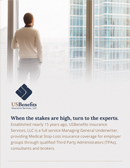How the Art of Comparing Stop-Loss Quotes Has Changed
Online car purchases have revolutionized how many people buy used cars today. From the comfort of your own home, you can select the make, model, year and color you want, line up three of the exact same car, and just buy the cheapest one. But if you don’t review the vehicle history, understand the warranty differences, and take it for a test drive, you’re just asking for trouble down the road.
For many producers, brokers and groups, the process of evaluating stop-loss insurance quotes can be eerily similar.
Twenty years ago, a key consideration in the selection process was getting to know your managing general underwriter (MGU) and building trust in that relationship. But fast forward to present day, and we find an oversaturated market, where the only difference in quote after quote appears to be the bottom line. But is that the best way to evaluate quotes?
We asked our Vice President of Underwriting Tim Barden the five things he would ask when reviewing a stop-loss quote. A 30-year veteran in this industry, Tim shared what to look for when you’re underneath the hood:
- What is the experience level of your underwriting team? Low-cost contracts are often represented by new market players and inexperienced staff members. This can result in unsatisfactory performance or costly mistakes. Ensuring you’re partnering with an experienced, trustworthy group underwriting team is key.
- Do you understand the current stop-loss market? The right underwriter will be able to field your toughest questions – be it administrative, financial, operational, or clinical. He or she has likely seen it all before and will have answers to specific scenarios and concerns.
- What alternative solutions do you have for this type of quote? When you provide all of the required details for your quote, a talented stop-loss provider can go above and beyond. This means not only providing accurate projections for what you asked, but also recommending alternative angles and additional ways to save money if your organization has some flexibility.
- Are you considered a stable organization? High turnover is never a good sign – and that goes for both staff and clientele. How long has your stop-loss provider been in business and how long have they had the same carrier(s)? Do they have long-term clients, or do they change with each new contract year? Ask to talk to those customers to see how they have been treated over the years.
- How many people will be handling my account? Quality beats quantity in this situation. Often, having a smaller underwriting team means availability and accessibility to the underwriting decision maker when turnaround time is essential.
Of course, securing the best price that fits within your budget is very important when comparing stop-loss quotes. But it is just as essential to look beyond the numbers. Knowing the experience, reputation, stability, and longevity of your potential partner will save you much more on the long road ahead.

Tim Barden
Vice President of Underwriting
US Benefits Insurance Services
tb@usbstoploss.com
949-468-3031
Tim Barden has more than 30 years of group underwriting experience. Prior to joining USBenefits, Tim was a Regional Underwriting Manager with TRU Services, LLC and also previously worked for the first USBenefits (HCC Benefits purchased). Tim brings strong technical skills along with a realistic sense of market conditions and stop-loss issues to his valued clients.





